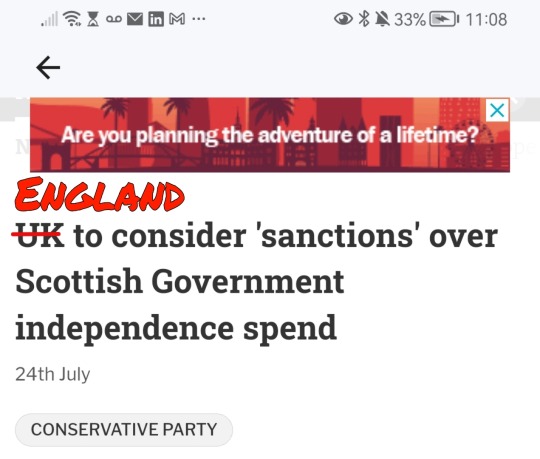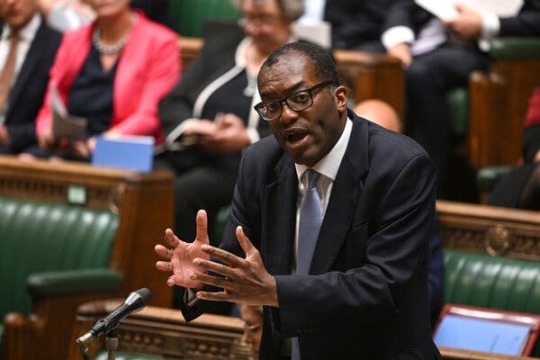#english government
Text
The British government says that inflation isn't "that bad".
I have coeliac disease and am physically unable to digest gluten or wheat. I have to eat food made of corn flour, and it's already four times more expensive than food made out of wheat flour. Inflation has made it damn near impossible to find ordinarily priced food that I can actually fucking eat, because all the cheap alternative stuff designed to help people save money have a shit ton of wheat it.
Next time the government wants to tell me that inflation isn't "that bad", I want them to live on a gluten free diet for a week with an average weekly wage. Maybe then they'd fucking understand that just because abled people can cope with inflation, it doesn't mean disabled people can.
Fuck the UK government. Fuck the monarchy as well.
#just fuckin pissed#i hate my government so much#uk#united kingdom#britain#england#british monarchy#monarchy#british government#government#fuck the government istg#english government#united kingdom government#coeliac disease#celiac disease#celiac#gluten free#allergies#disability
67 notes
·
View notes
Text
Governmental Power: England vs France
Throughout my studies of the French Revolution, especially when I have been looking at the circumstances surrounding why Louis XVI called the Estates General, I have been wondering about why the French Governmental system was so different to ours, and what had led to their being so utterly different.
The main difference I can see is how centralised the government is. In France in the late 18th c, the governmental power is within the person of the king. When the French monarchy removed from Paris to the Palace of Versailles, the entirety of the major aristocracy moved too, as being physically close to the king meant you had a share in power. Staying in your duchy in the south (for example) would leave you completely out of any governmental decisions. However, in England, thanks to the Magna Carter, when the barons forced the king into enshrining the rights of the nobility in law, the king had to allow the nobility to aid in running the country, even if they were in their own provinces at the time. When the Wars of the Roses started, the nobility were the ones who ruled their own parts of the country, keeping relative law and order whilst the monarchy imploded. Government was decentralised, and although the king still had the majority of the power, delegation was much more common, as a way of keeping the unruly nobles on your side.
So, England had a decentralised governmental system, and France had a centralised one focused on power of the king. But then why was it that the majority of the actions of the Revolution, taking place in Paris, have such a huge effect on the entire country?
If one goes back to the 12th century, then the Early Plantagenet Kings of England not only ruled the British Isles, but also half of France, one can see that the French kings didn’t have a lot of wriggle room in terms of where they could govern from. The traditional seat of Rheims was primarily in English hands (and would fall into them again in the Hundred Years War), so Paris, as a major city situated helpfully on the Seine, seemed a good spot. The fact that the parlements - French Law courts, nothing like our governmental system - were set up there meant that a bond of government between the king and Paris was established. When the King moved to Versailles, Paris might have felt like it’s age old right to the inner workings of government had been stripped from them. With the Revolution itself, Paris becomes the seat of all government, and so the usual ripples of edicts made by the king, and filtering through the rest of France, is replaced by similar ripples made by the Revolutionaries. England never had this problem. Thanks to the nobles being in the countryside, the kings laws were enforced with more rapidity, and although Westminster (now incorporated into London) was the seat of Government, there was never as much of a sense that Government belonged in the Capital, not least because the king travelled around so much, taking the government with him.
There is also the simple fact that England is much smaller than France, so messages could get to the edges of the country quicker.
Another thing to consider is the fact that by the 18th c, England has been through several civil wars where the nobles had fought against the king. This weakens the absolute monarchy to the state where we have a government that is more biased towards a rule by the people, although in practice the rotten boroughs etc meant that Parliament was by no means perfect. To my knowledge, France doesn’t have that. The king is rarely rebelled against, or has his head cut off by the nobles or governmental bodies. The medieval idea of the divine right to rule is never challenged, and as a result, the feudal Estates mean that the government of the country is in the hands of about 5% of the populace, whilst the majority just have to accept the fact there is nothing they can do.
Finally, I would like to point out that the French people, as a result of being unable to have a say in their government for so long, have a history of rioting. The Bastille was built as the direct result of a major Parisien riot in the 13th c, and the Civil War between the Burgundians and the Armagnacs sees Parisiens happily chopping off peoples heads and barricading nobles into their palaces. The only way that the French people know of protesting is by violence. In England, we have the fact that the lords of the manor are more likely to listen to your pleas, common men can be elected to one of the Houses of Parliament. The people have more representation in government, so do not have as much incentive to riot.
If there is anything I have written that is inaccurate, or there is an example I have overlooked, do let me know.
#frev#french revolution#english government#political history#Paris#medieval history#civil war#historical musings
13 notes
·
View notes
Text

I know The National claims to be a Scottish independence paper but they don't hammer down the points that any decisions made from Westminster are by the English government. They may say they are 'The UK government' but that's just a power-play to maintain the controlling relationship they have over the other countries in the UK. The Scottish government can spend money on anything they think will benefit Scotland. It's absolutely nothing to do with England.
4 notes
·
View notes
Text
Um hi engish government what the fuck
#trans guidence#english government#trans stuff#transgender#trans news#trans#school#school news#bro what the actual fuck
2 notes
·
View notes
Text
The New York Times: U.K. Government Goes Full Tilt on Tax Cuts and Free-Market Economics

Sept. 23, 2022
LONDON — Britain’s new prime minister, Liz Truss, gambled on Friday that a heavy dose of tax cuts, deregulation and free-market economics would reignite her country’s growth — a radical shift in policy that unnerved global investors already rattled by an energy crisis, surging inflation and the specter of widespread recessions.
The British announcement came as markets around the world have been tumbling for weeks in response to higher interest rates and recession fears. The slide continued on Friday with the S&P 500 index falling close to its lowest point of the year and markets across Europe tumbling.
The move by Ms. Truss’s government indicated a sharp break with the previous prime minister, Boris Johnson, and with a generation of more fiscally minded Conservative governments.
For Ms. Truss, the measures — which critics liken to the “trickle-down economics” of the 1980s — amounted to a breathtaking bet that Britain’s economy would return to robust growth before she faces voters in two years. But the tax cuts, on top of extensive state intervention to cap soaring household energy bills tied to Russia’s war in Ukraine, are likely to require tens of billions of pounds of new government borrowing, deepening anxiety about Britain’s public finances.
British stocks and bonds and the pound all plummeted after the announcement, with the currency falling to fresh lows against the dollar, levels not seen in nearly four decades. The jitters spread to the United States and Europe, where stocks fell sharply amid fears that more aggressive increases in interest rates would be needed to quell inflation and that economies could slide into painful recessions this winter.
These fears are even more acute in Britain, where economic growth has ground to a halt, inflation is running at its fastest pace since the early 1980s, and the Bank of England has already raised rates seven times to curb surging prices.
Against that fraught backdrop, the new chancellor of the Exchequer, Kwasi Kwarteng, abandoned a proposed rise in corporate taxation and, in a surprise move, also abolished the top rate of 45 percent of income tax applied to those earning more than 150,000 pounds, or about $164,000, a year. He also cut the basic rate for lower earners and cut taxes on house purchases.
“We will focus on growth, even when that means taking difficult decisions,” Mr. Kwarteng told a packed House of Commons. He acknowledged that “none of this is going to happen overnight,” but said that the focus on tax cuts “is how we will turn this vicious cycle of stagnation into a virtuous cycle of growth.”

It is hard to overstate the magnitude of the policy shift from Mr. Johnson’s government, which just one year ago had announced targeted tax increases to offset its increased public spending because of the pandemic.
While Ms. Truss had run for Conservative Party leader as a tax cutter, the breadth of the cuts announced Friday surprised the markets. They will cost £45 billion, or about $49 billion, over the next five years — the largest tax cuts compared with any budget since 1972, according to the Institute for Fiscal Studies, a London-based think tank.
The government contends that reducing taxes will encourage more investment and that the benefits will flow through the economy. But the risk is that the measures are insufficient to reverse years of lackluster productivity and business investment.
The tax cuts follow promises already made to shield households and businesses from the soaring cost of energy, which have tempered both the projected increases in inflation and the expected decline in economic growth. But together, they will mean more government borrowing, and one of the biggest dangers is that investors will be dubious that the government’s new policy will work. That could push the cost of borrowing to painful highs and make the debt levels unsustainable.
Those fears led to the steep sell-off of British assets on Friday. Some analysts said the risk that the pound and the dollar could soon reach parity had increased, reflecting both the pound’s tumble and the dollar’s role as a refuge during global economic storms.
Beyond fears of unsustainable government borrowing, critics said Britain’s fiscal and monetary policies were dangerously at cross-purposes.
The Bank of England is trying to quell inflation by using one of the few tools it has: interest rate increases that dampen economic activity. Yet the government is trying to fire up the economy, for example by stoking the housing market and by widely cutting taxes, a combination that could fuel higher inflation.
On Thursday, a former deputy governor of the Bank of England, John Gieve, told the BBC that the central bank and the government were “pulling in different directions.”
The chancellor’s statement in Parliament on Friday underscored the free-market, small-state, tax-cutting instincts of Ms. Truss, who has modeled herself on Margaret Thatcher, who was prime minister from 1979 to 1990. Thatcher’s economic revolution in the 1980s turned the economy around, although at a high cost for many, with rising unemployment and labor unrest.
Some dispute the comparison to Thatcher. The plans announced on Friday mean a large increase in government borrowing at a time of rising interest rates, and so far there has been no indication of corresponding spending cuts. While Thatcher was a committed tax cutter, she believed in balancing the books first.

Ms. Truss’s tax cuts, which disproportionately favor high-wage-earners, have instead drawn comparisons to the tax policies of Ronald Reagan, the U.S. president who argued that tax benefits for companies and the wealthy would benefit those with lower incomes.
Nonetheless, Mr. Kwarteng’s plans — and the ideology behind them — will probably set the framework for the campaigning before the next general election, which must be held by January 2025.
Ms. Truss will be hoping that, during the intervening two years, policies that she says are “unashamedly pro-growth” can engineer at least the start of a solid economic recovery, allowing her to appeal to voters to stick with the Conservatives — rather than risk switching to the opposition Labour Party.
By describing his announcement as a “fiscal event” rather than a budget, Mr. Kwarteng avoided the need for a government watchdog’s in-depth assessment of the economic and fiscal impact of his plans.
On Friday, the government gave the first glimpse of how much the caps on energy bills might cost, estimating that the price tag would be £60 billion in the first six months alone. Mr. Kwarteng also gave estimates of how much the tax cuts would cost.
Even as Mr. Kwarteng took questions from his fellow lawmakers in Parliament, British assets began tumbling in financial markets. He responded to that news by saying, “The markets react as they will, but the growth plan will very soon show we are on the right course and we are steering us to a more prosperous future.”
The pound has weakened against most major currencies this year, but those losses intensified on Friday. The pound fell more than 2 percent against the euro and dropped 3.5 percent against the U.S. dollar, to below $1.09. The FTSE 100, Britain’s benchmark stock index, lost about 2 percent.
The yield on government bonds, a measure of borrowing costs, jumped higher as investors digested the tax cuts and the policies that will require £72 billion more in bond sales than previously forecast.
Ms. Truss’s government now says that igniting growth by lowering taxes and cutting regulation is its central mission, even if that means courting unpopularity; it will also, for example, lift the cap on the bonuses that can be offered to bankers.
Scotland’s first minister, Nicola Sturgeon, said on Twitter that the announcement would send “the superwealthy laughing all the way to the actual bank” while increasing the number of people relying on food banks, which help those unable to pay for essentials.
Mr. Kwarteng also outlined plans to create “investment zones,” with liberalized planning rules, where targeted and time-limited tax cuts will be offered to encourage construction of shopping malls, restaurants, apartments and offices.
Mr. Kwarteng also said that he aimed to speed up infrastructure projects, including new roads and railways, by reducing the burden of environmental assessments required before work can begin.
Rachel Reeves, who speaks for the opposition Labour Party on economic issues, described the announcement as “a budget without figures, a menu without prices” and “an admission of 12 years of economic failures” from a Conservative Party that has been in power since 2010.

#The New York Times: U.K. Government Goes Full Tilt on Tax Cuts and Free-Market Economics.#britian#english government#british economy#liz truss
1 note
·
View note
Text
Fearing the worst, Jones wrote to The Sydney Morning Herald:
It is fresh in the recollection of most now living, that by the misrule of the English government, the present United States of America withdrew their allegiance from the parent state; and it does not require the spirit of prophecy to foretell that, from the course she is pursuing towards this country, similar results will follow; but I hope unattended with the direful consequences of the American revolution.
"Killing for Country: A Family History" - David Marr
#book quotes#killing for country#david marr#nonfiction#richard jones#the sydney morning herald#newspaper#journalism#misrule#england#english government#usa#united states#united states of america#independence#american revolution
0 notes
Text




Haii!!1 1!! !1:333 (don't even ask me wth these mean)
#to the person who was tryna figure what classes im in based off my notes YOU WERE WRONG#IT WAS GEOMOTRY AND AMERICAN GOVERNMENT YOU IDIOT!! AND ENGLISH!!!#sorry for calling you an idiot#fanart#simon petrikov#golbetty#adventure time#betty grof
417 notes
·
View notes
Text
it's really funny to me that Arthur crashed the boat and everyone gossiped so much about it that it got back to Jack and Quincey
#dracula daily#you know everyone who lives in the area was down the pub that night talking about these weird english boys#'first they pretended they were government officials and then they smashed into the bank. oh and one guy had a huge knife for some reason'
2K notes
·
View notes
Note
Would Midnight be patient with my fellow discalculia girlies... I love her but am So So Pathologically Bad at math
Midnight teaches advanced algebra to cats, you'll be fine. She'll conjure up a fractal for you, color each part of the equation, show how each part interacts and what it looks like when you change it
She'll take you out to the beach and explain the wind and the tide, compare them to each axis on the formula she showed you, and modify one factor. The wind dies down and the sea becomes as smooth as glass.
"Smoothness for the-waves you-see?" She waits for you to nod, never rushing you along, even the most casual questions are genuine, "Excellent! For this is example of maths I-teach. Nature it-will-happen. Simpleness it-being. You-will-understand."
#Giant robot meme and person staring at it#Person says#''wow! There is beauty in every corner of life and all can be understood by learning the simple and complex sciences that govern existence!#Gun being shot up says ''math is incomprehensible magic''#I am also a dyscalculia girlie fhehdjdhd#Funfact a major reason I committed so hard to Clan counting being so convoluted is because I want the math girlies--#To be as confused with numbers as I always am <3#If I can't count you won't either that is a threat <3#I have noticed a recurring theme in my work (affectionate) is Weird Girl Who Does Math#This rework of Midnight is like... 1 example of at least 3 characters who use math for some magical purpose#And they are all girls#(And yes they smoke weed)#The other 3 are OCs though and it is always either a metaphor for magic or directly tied to something arcane in their universe#MATH SCARY (writes endlessly about math)#BB!Midnight#Better bones au#Also another side note she speaks Lakemew. Ancient Lakemew. Which is SVO ordered like English#So I write her in OSV order like Clanmew (and like her canonic cadence) in these examples where she's speaking Clanmew#But funny enough she would sound the most 'normal' to an english speaker
102 notes
·
View notes
Text
I hate Dead Apple not because of the actual content of the movie, but because the beginning slideshow made me aware of the characters' ages and irreparably damaged my perceptions of them and their relationships
I thought Dazai and Kunikida were like 25? 26? Idk. I shipped Atsushi and Kyouka because I thought Atsushi was like 15-16 like literally every other anime protagonist (If he's 18 then he didn't have much time left at the orphanage regardless of the tiger).
Also Mori is just out of his thirties. Talk about ambitious. Dude's had like 3 separate careers that each take 10+ years to achieve.
Fitz is like 33?! A teen father apparently? Make it make sense.
I really feel like they were just pulling numbers out of a hat.
#I once saw someone rag on Kouyou's English voice actress because “she sounds like she's 40” Well she is. Spiritually. To me. At least 30.#Ango is a triple agent with level 90 government clearance at college graduate age#It took me awhile to adjust to this information#bsd#bungou stray dogs#bsd dead apple#bsd atsushi#bsd dazai#bsd kunikida#bsd kyouka#bsd mori#bsd fitzgerald
252 notes
·
View notes
Text
why does every article reporting on idf war crimes go "hamas, who started the war on october 7th with their brutal terrorist attack slaughtering innocent israeli civilians, has condemned the idf's use of-"? like, nearly verbatim every single time. we know about october 7th. we know by now. half the time, hamas isnt even relevant but they gotta find some way to sow doubt and numb any potential compassion responses. will you get fired if you show sympathy for murdered palestinian civilians without first adding a disclaimer saying its all their fault for being born in gaza? if you call "palestinians under 18" children? if you use the words "murdered" or "brutal" or "massacre" for acts that didnt occur on october 7th? if you call a spade a spade? why are israeli reports front page news without proper fact-checking but palestinian reporting is always "allegedly" even when theres video evidence? why does the idf not get the hamas treatment of reminding everyone that theyre biased before treating their words as law, like they havent been caught bold-faced lying again and again?
#soooooo fucking infuriating#'palestinians are allegedly starving but thats what hamas (who are savage terrorists in case you forgot) said as well so who knows?'#'idf soldiers are allegedly bragging about and showing pictures and videos of their war crimes on social media but#its not in english so we may never know what theyre saying. palestinian ''civilians'' are translating so whatever they say must be wrong'#'in other news. heres what ''doctors'' are referring to as a ''calendar'' but is written in arabic (terrorist language) so the idf must be#telling the truth when they say its proof they are all evil and must in some nebulous way suddenly stop living'#to be fair. the 'secret hamas names list disguised as calendar but REALLY about oct 7' shit was the target of skepticism quite early on#but it really does show how often the idf lies to justify obvious war crimes#maybe they should provide verified evidence or even just be given a bias disclaimer before printing their claims as fact???#every single fucking death toll is phrased as 'hamas-run ministry of health reports death toll of x' like?#yeah? thats their fucking government? what else do you expect?#you do understand that the healthcare portion of their government is probably more reputable#than what the phrasing of those headlines are obviously trying to imply?#i understand that bias is still possible there but its not armed combatants making shit up#its doctors who receive govt paychecks doing their best to identify the disfigured bodies not buried under rubble#youre not slick with that wording
21 notes
·
View notes
Text
i think i might be putting way too much focus on language dynamics in this fic <- lives in an area with fraught linguistic tensions
#once an anglo-quebecois overcomes their cringe 'anglos are being targeted by the government' phase#they will unlock political enlightenment and horrible brainworms#does anyone wanna see the certificate i have that allows me to receive government services in english fkjghfkh#redposts
21 notes
·
View notes
Text
How many should bleed for you, dear nation,to bring blushes to your lackluster cheeks?
How many lamentations will it take to satisfy your heart?
How many tears will make your wilderness blossom?
-Faiz Ahmed Faiz (urdu poet)
#palestine#english translation#urdu poetry#gaza#israel#America#colonialism#iran#usa#us government#free palestine#genocide#lgbtqia#lgbtq community
31 notes
·
View notes
Text
ultimate hater take is that there are two types of targ nation people, there's the rabid twitter people who think every single targ except like three or four (usually aegon ii, aemond, aegon iv, sometimes maegor and aerys ii) are Undisputed Uncomplicated Heroes Of The Story and that the series will end with a targ restoration happy ending. then there's the targ nation people who think basically every single historical targ was a villain EXCEPT FOR dany and she is not only the Undisputed Uncomplicated Hero Of The Story but will absolutely burn/sack both Vaes Dothrak and Volantis but these will be Good Things because she's killing slavers.
#the second group annoys me more bc they write meta and make graphics that are good for Other Characters#it's like 'i want her to pull a nettles!' but they actually mean they want her to keep sacking cities with drogon. buddy....#or they think she'll die in the long night fighting the others.#i also think the second group all collectively talk like the most annoying waspy dude in your english 180 class. canNOT stand that#they're also usually tg and pro d and it's like. u really think there's no similarities between nyra and dany? alright.#the first group is not tg tho they are all tb and they think jaehaera's murder was narratively justified which is so. okay.#anti daenerys targaryen#anti dany stans#i'm sorry. i can't even begin to explain the level of pain i'm in. i am coping by thinking about anything else#and working on this stupid smokey the bear challenge. shout out all my librarians getting free shit from the government.#fandom wank#me bitching about the tags
14 notes
·
View notes
Text
For Not-Italians, an Italian rapper said "Stop the genocide" at the end of his final performance at the Sanremo Song Contest and got called out by the Israel embassy for "spreading hate".
You can read the article for yourself, but what the article doesn't say is that our goverment who is now falling over themselves to support Israel and claiming to fight against all anti semitism is lead by the Brothers of Italy (Fratelli d'Italia) which is a fascist party.
#'we are not antisemitic' you think mussolini and his racial laws were great!#italy#also can we stop pointing out ghali is of tunisian descent. i know why they are doing it. been there done that.#ghali#sanremo 2024#hope there are no typos I'm sleep deprived#i'm just very bitter about my country and how it's being painted in this scenario#i don't live there anymore but I understand it's a mess#and once again the government is pitting the minorities against each other#also is everyone hyperfocusing on ghali because he openly used the word genocide or because he is of tunisian descent? we'll see#also the translation of his speech was kinda bizarre but I am too tired to check what is bothering me the english just sounds bad
14 notes
·
View notes
Text


09.04.23
-> english study guide
-> cases i need to know for ap gov. i'm a fan of the new faber castell highlighters.
-> motivation is unreliable. be productive for productivity's sake.
🎼snitch by reyn hartley
#studyblr#studying#aesthetic#studyspo#english#ap government#study#dark academia#music#notes#kimblestudies
32 notes
·
View notes